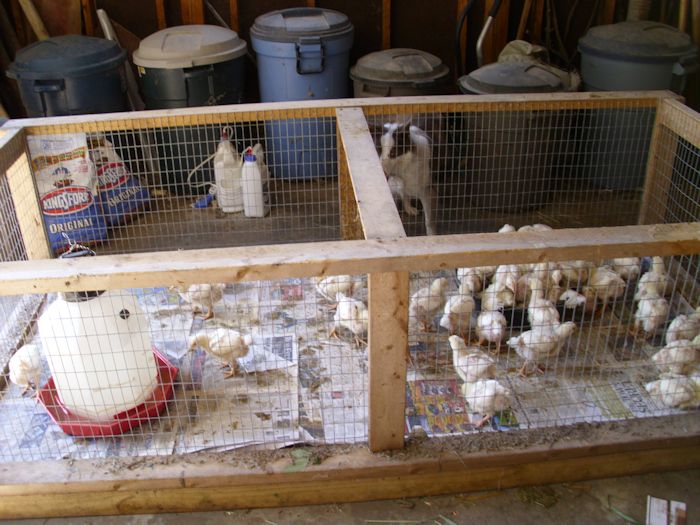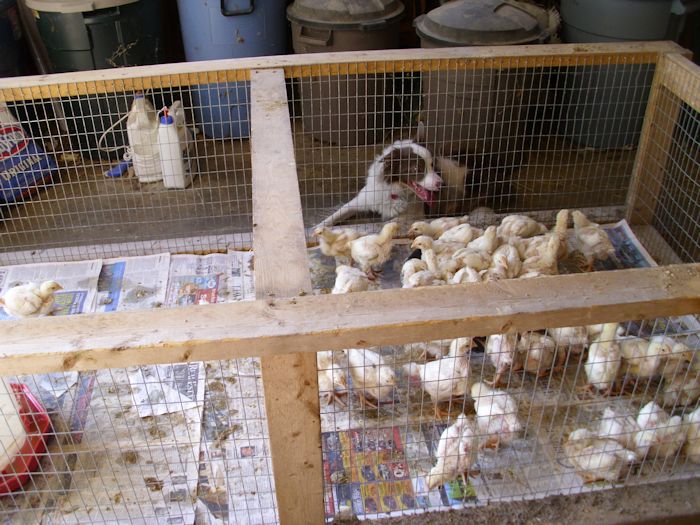Our animals amaze me at times. We let the chicks out of their sheltered environment the other day and into the larger cage we use to raise them until they’re large enough to go outside. As part of that process, we introduced Shelby to her charges for the first time. Each year Shelby, our border collie, takes care of our meat chickens for us. The process of introduction is important because she has to understand that the chickens are her job, and not something to play with.
Getting Shelby used to the idea of herding chickens instead of sheep took a little while, but not too long. We got their scent on her so she would associate their scent with something to be protected. Then we introduced a chick under highly controlled circumstances and praised her when she sniffed the chick, but didn’t do anything else to it. We then allowed her to nuzzle and move the chick into a protected area. Again, this all has to do with her herding instincts and getting the idea across that those chickens are her job. Border collies have a strong need to be helpful and to feel they have a task they need to do.
The first year we tried raising meat chickens, we did it without dog support. It was a nightmare. The first night we put the chickens out thinking the chicken tractors would keep them safe. Quite a few were gone by morning because raccoons had damaged the cage, gotten inside, and partially eaten a number of them. With stronger mesh in place, we thought our troubles were over, but the third night a weasel got in by digging under the tractor and bled half the chickens to death. Out of 75 chickens that year, we processed perhaps ten or fifteen—the rest were killed by animals. It was an eye opener for us. If you live near a woods, use chicken tractors to give your chickens a lot of freedom, and don’t want to spend your nights guarding the chickens, you really do need to train a dog.
The second year we trained our first dog, Jif, to take care of the chickens. Now, Shelby has the job. She starts her shift protecting the chickens by viewing each one quite carefully. She paces back and forth, looking each chick over.
After she is satisfied with the state of the chicks, she lays down but doesn’t take her eyes off of them. During the evening, she’ll get up and check the chicks fairly often. If anything goes wrong, she makes quite a ruckus until we get there to see what is wrong.
Once we put the chicks (now chickens) outside in the chicken tractors, Shelby will stay with them all during the summer months. Every night she’ll assume her post to watch them intently. She does come into the house during the daylight hours because we can watch the chicks then and we’ve noted the dog won’t sleep on duty. She comes in each morning quite tired and sleeps most of the day.
We do provide her with a house outside, but she seldom (if ever) uses it to gain protection from the elements. What we’ve noted is that she puts anything that she has caught trying to get to the chickens in her house. So, we’ll come out and find a dead weasel or other animal from time-to-time and clean it out. On rainy nights, when we’re sure everyone else will be under cover from the rain, Shelby spends the night inside (mostly because we worry that she won’t use her house—she’ll guard those chickens no matter what).
Animals really are amazing, but only if you let them be amazing. Sometimes, that means working with an animal’s natural instincts to see what is possible. Shelby was bred to herd sheep, but now she herds chickens instead. Not many people would think that possible, but we’ve made it happen with two dogs now and I have no doubt that border collies can work just fine with chickens. Let me know your thoughts on amazing animal behaviors at [email protected].


